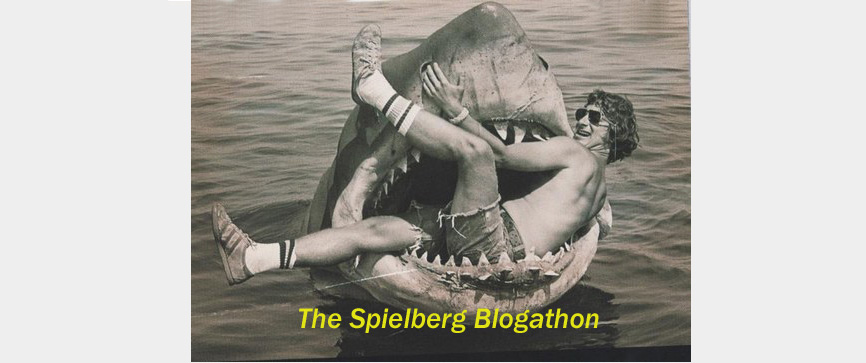
E.T. The Sacred Cow
by Andreas
All of this is not to say that I find E.T. totally worthless. I just don’t think it deserves the enthusiastic critical accolades it’s received since its release, setting it up as this unassailable masterpiece. For me, it’s symptomatic of Spielberg’s worst and best qualities. In terms of the former, it’s ultra-commercial (and with one rerelease after another, the E.T. profits never stop flowing), preachy, and about as subtle as a hammer to the face, painting with the very broadest of strokes.
Encountering Spielberg: A Steven Spielberg Profile (Part 5)
by Trevor Hogg
Venturing into the realm of science fiction writer Phillip K. Dick, Steven Spielberg produced a cinematic adaptation of Minority Report (2002). In the near future, mutated psychics known as “precogs” are used by law enforcement agencies to predict and prevent crimes. “What first attracted me was that there are two alternative belief systems to this whole Phillip K. Dick idea,” explained the filmmaker. “The one belief system is self-determinism; you are in charge of your destiny. Every move you make is your move and you’re in control of your own life and you can determine the outcome. And the other school of thought is that we are following a map to our destinies that were written by a higher power and we’re just following a script that somebody else wrote. So if Tom Cruise’s character has been fingered to kill somebody, can he change his destiny?”
The Spielberg Ending
by Sean Weitner
So let's really consider those endings, starting with Spielberg's last Oscar at-bat. This isn't about being a fanboy — I've struggled with Spielberg in these pages for a long time — but about trying to take the long view of film history, in which all of this player-hating will seem short-sighted and viewers will acknowledge the director's efforts to take his huge audiences somewhere unexpected as the kind of artistic ambitiousness rarely seen at the multiplex.
A.I.
by Ilias Dimopoulos
It’s in the tone of Mr. Spielberg’s direction that things begin to radiate the constantly evolving character of the actual director (and writer - for only the second time since Close Encounters of the 3rd Kind…) of the film. “Overcoming” the coldness of the clearly Kubrickean first act, Spielberg indulges gradually to some of his most unforgettable magnum opus moviemaking, building monumental sets, moving his camera in an energetic frenzy of talent and ideas. Supposedly, in the last “to Jupiter and beyond” act, this is well suited. Yet I ‘m not sure how Kubrick would enjoy the second act extravaganza. Which brings me to the first crucial question: Should we in any case bother with “how would Kubrick have done it?” The answer is an emphatic no. Regardless of Mr. Spielberg’s declared homage intention, after all is said and done, A.I should definitely reflect his own intentions.
by Andreas
All of this is not to say that I find E.T. totally worthless. I just don’t think it deserves the enthusiastic critical accolades it’s received since its release, setting it up as this unassailable masterpiece. For me, it’s symptomatic of Spielberg’s worst and best qualities. In terms of the former, it’s ultra-commercial (and with one rerelease after another, the E.T. profits never stop flowing), preachy, and about as subtle as a hammer to the face, painting with the very broadest of strokes.
Encountering Spielberg: A Steven Spielberg Profile (Part 5)
by Trevor Hogg
Venturing into the realm of science fiction writer Phillip K. Dick, Steven Spielberg produced a cinematic adaptation of Minority Report (2002). In the near future, mutated psychics known as “precogs” are used by law enforcement agencies to predict and prevent crimes. “What first attracted me was that there are two alternative belief systems to this whole Phillip K. Dick idea,” explained the filmmaker. “The one belief system is self-determinism; you are in charge of your destiny. Every move you make is your move and you’re in control of your own life and you can determine the outcome. And the other school of thought is that we are following a map to our destinies that were written by a higher power and we’re just following a script that somebody else wrote. So if Tom Cruise’s character has been fingered to kill somebody, can he change his destiny?”
The Spielberg Ending
by Sean Weitner
So let's really consider those endings, starting with Spielberg's last Oscar at-bat. This isn't about being a fanboy — I've struggled with Spielberg in these pages for a long time — but about trying to take the long view of film history, in which all of this player-hating will seem short-sighted and viewers will acknowledge the director's efforts to take his huge audiences somewhere unexpected as the kind of artistic ambitiousness rarely seen at the multiplex.
A.I.
by Ilias Dimopoulos
It’s in the tone of Mr. Spielberg’s direction that things begin to radiate the constantly evolving character of the actual director (and writer - for only the second time since Close Encounters of the 3rd Kind…) of the film. “Overcoming” the coldness of the clearly Kubrickean first act, Spielberg indulges gradually to some of his most unforgettable magnum opus moviemaking, building monumental sets, moving his camera in an energetic frenzy of talent and ideas. Supposedly, in the last “to Jupiter and beyond” act, this is well suited. Yet I ‘m not sure how Kubrick would enjoy the second act extravaganza. Which brings me to the first crucial question: Should we in any case bother with “how would Kubrick have done it?” The answer is an emphatic no. Regardless of Mr. Spielberg’s declared homage intention, after all is said and done, A.I should definitely reflect his own intentions.

Blogathon
ReplyDeletehttp://adf.ly/bMd0U